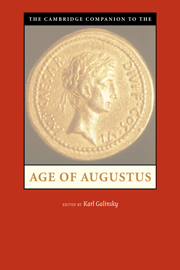Book contents
- Frontmatter
- Introduction
- Part I Political History
- Part II Intellectual and Social Developments
- Part III The Emperor's Impact
- 7 The Emperor as Impresario: Producing the Pageantry of Power
- 8 Augustus and Roman Religion: Continuity, Conservatism, and Innovation
- Part IV Art and the City
- Part V Augustan Literature
- Part VI Epilogue as Prologue
- Select Bibliography and Works Cited
- Index
7 - The Emperor as Impresario: Producing the Pageantry of Power
from Part III - The Emperor's Impact
Published online by Cambridge University Press: 28 March 2007
- Frontmatter
- Introduction
- Part I Political History
- Part II Intellectual and Social Developments
- Part III The Emperor's Impact
- 7 The Emperor as Impresario: Producing the Pageantry of Power
- 8 Augustus and Roman Religion: Continuity, Conservatism, and Innovation
- Part IV Art and the City
- Part V Augustan Literature
- Part VI Epilogue as Prologue
- Select Bibliography and Works Cited
- Index
Summary
“For you will live as in a theater in which the spectators are the whole world” (Dio 52.34.2). Dio's citing of an insight he imagines Maecenas having offered to Octavian more than two centuries earlier employs the truth of hindsight. Dio's Maecenas also counseled the young master of the Roman empire on how he might “enjoy fully the reality of monarchy without the odium attached to the name of 'King'” (52.40.2), and that he should “adorn this City with utter disregard for expense and make it magnificent with festivals of every kind” (52.30.1). Dio knew just how well Octavian and his successors had taken such advice to heart. Inside Rome's imperial theaters the spectators were presented with dazzling entertainments calculated to impress them with the glory of their patron, the princeps, whose performative presence added to the excitement and splendor of the occasion. The formal public spectacles - pervasive, massive, and influential as they were - demand our attention. But such performances are only the most obvious example of how the spectacular and the theatrical became progressively embedded in every aspect of public life during Augustus' reign. Indeed, the very city itself, according to Strabo (5.3.8), became a vast mise-en-scène “presenting to the eye the appearance of a stage-painting, offering a spectacle one can hardly draw away from.” Its inhabitants too, ruler and ruled alike, were exhorted by the symbols, mythology, poetry, art, and architecture of the age to conceive themselves as actors in a great historical pageant: the expansion, perfection, and celebration of Roman power and Roman achievement.
- Type
- Chapter
- Information
- The Cambridge Companion to the Age of Augustus , pp. 151 - 174Publisher: Cambridge University PressPrint publication year: 2005
- 6
- Cited by

